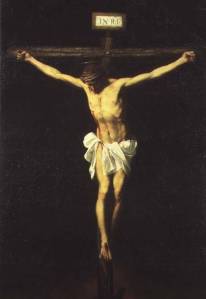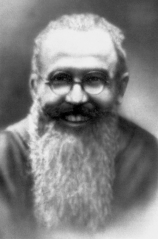Imagine for a moment the utter despair of the disciples on Holy Saturday. For three long years they had toiled ceaselessly with their Master, leaving livelihoods, families, and everything else behind. They had loved him devotedly, spending their days learning the deepest wisdom from him, accompanying him on wearying journeys, enduring scorn for his sake, eating and sleeping with him, and witnessing his jaw-dropping miracles—all the while confident that they would enjoy an exalted place in his earthly kingdom, which would certainly be ushered in at any moment.
Then began Holy Week, which was the week of shattered hopes for these faithful men. Their beloved Jesus, whom they expected to utterly destroy the powers of evil and national oppression, was stripped of both his clothes and his dignity. He was savagely beaten, mocked, and tortured. Finally, he was nailed to a gibbet, bloodied beyond recognition, for everyone in the world to gawk at.
The Father Who is There
I recently wrote a column on the importance of fatherhood that was published in Truth and Charity Forum.
Recently, at the park with my wife and son, I witnessed one of the saddest sights I’ve seen in a long time. A little boy, about five or six, was there with his dad. Normally, this would be a wonderful thing, but the tragedy was, they weren’t spending time with each other. The dad was engrossed in his phone — ignoring his child.
No matter what he tried, this little boy could not get his father’s attention. He jumped up and down yelling, “Dad! Dad! Look at me!” He climbed up the jungle gym, went down the slide, raced in circles, all the while hoping that he might win the affectionate glance, the loving interaction, of his father. But the dad wouldn’t even look up from his phone. He would respond with a distracted grunt, if that.
I will lift up my eyes…
“Satan was the most celebrated of Alpine guides, when he took Jesus to the top of an exceeding high mountain and showed him all the kingdoms of the earth. But the joy of Satan in standing on a peak is not a joy in largeness, but a joy in beholding smallness, in the fact that all men look like insects at his feet. It is from the valley that things look large; it is from the level that things look high; I am a child of the level and have no need of that celebrated Alpine guide. I will lift up my eyes to the hills, from whence cometh my help.”
– G.K. Chesterton
His Body and His Bride
In his sermon on the feast of St. George, Pope Francis made a wonderfully bold claim: It is not possible to follow or even find Jesus outside of his Church. Now, this is not a popular claim at all. It is currently in vogue to possess a personal religion, a “me and Jesus” faith that is completely indifferent or even antagonistic to any visible entity known as the Church. For all practical purposes, the individual is the entire Church. This ecclesiological understanding is perfectly suited to the relativistic age in which we live. We can have our cake and eat it too—we can have Jesus on our own terms without submitting to the inconvenient authority of a visible Church.
But the Catholic Church has always taught that the Church is the body of Christ, and if you reject the Church, you reject Christ. You cannot have Jesus without his Body. That is unthinkable.
What is interesting to note is that Pope Francis’ sermon was about evangelization. Pope Francis seems to be addressing the deadly cancer of religious indifferentism, which is without question the greatest threat to apostolic zeal in our evangelization.
If, after all, salvation is not a matter of embracing the truth revealed by Jesus Christ and preserved in his Church, but is rather merely a matter of believing anything, so long as the belief is sincere, then evangelization does not matter.
But if, on the other hand, what Pope Francis says is true, and Jesus cannot be found outside of his Church (he is echoing many popes before him), we must be fervent in our evangelization.
If we are to be effective in this new evangelization, we must once again realize that bringing people to Jesus means bringing them to his Church—the Church that is, despite its flaws and its frailty, both His body and His bride.
Here are a few quotes from Pope Francis’ sermon.
And so the Church was a Mother, the Mother of more children, of many children. It became more and more of a Mother. A Mother who gives us the faith, a Mother who gives us an identity. But the Christian identity is not an identity card: Christian identity is belonging to the Church, because all of these belonged to the Church, the Mother Church. Because it is not possible to find Jesus outside the Church. The great Paul VI said: “Wanting to live with Jesus without the Church, following Jesus outside of the Church, loving Jesus without the Church is an absurd dichotomy.” And the Mother Church that gives us Jesus gives us our identity that is not only a seal, it is a belonging. Identity means belonging. This belonging to the Church is beautiful.
The Church’s journey always takes place between the Cross and the Resurrection, amid the persecutions and the consolations of the Lord. And this is the path: those who go down this road are not mistaken.
Let us ask the Lord for this apostolic fervor that impels us to move forward, as brothers, all of us forward! Forward, bringing the name of Jesus in the bosom of Holy Mother Church, and, as St. Ignatius said, “hierarchical and Catholic.” So be it.
We Make Ourselves a Place Apart
Revelation
by Robert Frost
We make ourselves a place apart
Behind light words that tease and flout,
But oh, the agitated heart
Till someone find us really out.
‘Tis pity if the case require
(Or so we say) that in the end
We speak the literal to inspire
The understanding of a friend.
But so with all, from babes that play
At hide-and-seek to God afar,
So all who hide too well away
Must speak and tell us where they are.
A Longing for the Forgotten
The whole of human existence is a quest for what we have lost and forgotten. I attempted to express this in my essay, Art and Atheism, referencing art as one way we seek to remember our origins. T.S. Eliot expresses this much better and more poignantly, however, in these lines from Little Gidding of his Four Quartets.
We shall not cease from exploration
And the end of all our exploring
Will be to arrive where we started
And know the place for the first time.
Through the unknown, unremembered gate
When the last of earth left to discover
Is that which was the beginning;
At the source of the longest river
The voice of the hidden waterfall
And the children in the apple-tree
Not known, because not looked for
But heard, half-heard, in the stillness
Between two waves of the sea.
O my people, what have I done to you?
Yesterday, at the Good Friday service, our parish choir sang what is known the Reproaches. It is our dear Savior speaking to his people, asking them what he did to deserve crucifixion and death. We have all crucified Christ with our sins, and so this speaks directly to us.
Popule Meus
O my people, what have I done to you?
How have I hurt you? Answer me.
O my people, what have I done to you?
How have I hurt you? Answer me.
I led you out of Egypt,
From slavery I set you free.
I brought you into a land of promise:
You have prepared a cross for me.
I led you as a shepherd,
I brought you dryshod through the sea;
I fed you manna in the desert
You have prepared a cross for me.
I fought for you in battles,
I won you strength and victory;
Gave you a royal crown and sceptre:
You have prepared a cross for me.
I planted you, my vineyard,
And cared for you most tenderly;
Looked for abundant fruit and found none:
Only the cross you made for me.
Then listen to my pleading
And do not turn away from me.
You are my people: will you reject me?
For you I suffer bitterly.
The Creator Groaning and Travailing with His Creation
 No one says it like Chesterton. Lord Jesus Christ, have mercy on us.
No one says it like Chesterton. Lord Jesus Christ, have mercy on us.
“In every century, in this century, in the next century, the Passion is what it was in the first century, when it occurred; a thing stared at by a crowd. It remains a tragedy of the people; a crime of the people; a consolation of the people; but never merely a thing of the period. And its vitality comes from the very things that its foes find a scandal and a stumbling block; from its dogmatism and from its dreadfulness. It lives, because it involves the staggering story of the Creator truly groaning and travailing with his Creation; and the highest thing thinkable passing through some nadir of the lowest curve of the cosmos. And it lives, because the very blast from this black cloud of death comes upon the world as a wind of everlasting life; by which all things wake and are alive.”
-G.K. Chesterton: ‘The Way of the Cross.’
“No one in the world can change truth.”
 “No one in the world can change Truth. What we can do and should do is to seek truth and to serve it when we have found it. The real conflict is the inner conflict. Beyond armies of occupation and the hecatombs of extermination camps, there are two irreconcilable enemies in the depth of every soul: good and evil, sin and love. And what use are the victories on the battlefield if we ourselves are defeated in our innermost personal selves?”
“No one in the world can change Truth. What we can do and should do is to seek truth and to serve it when we have found it. The real conflict is the inner conflict. Beyond armies of occupation and the hecatombs of extermination camps, there are two irreconcilable enemies in the depth of every soul: good and evil, sin and love. And what use are the victories on the battlefield if we ourselves are defeated in our innermost personal selves?”
-St. Maximilian Kolbe (d.Auschwitz 1941).
Papal Fashion Watch: A Good Perspective

Dr. Taylor Marshall, of the excellent Canterbury Tales blog, has written a thought provoking post on traditionalists criticizing Pope Francis’ papal attire.
We should recall how Our Lord Jesus Christ rebuked the Pharisees for rebuking Him for not washing his hands ceremonially before meals. The Pharisees accused Christ of sin, because He did not obey the traditions of the elders. Christ sternly rebuked them for raising “breaking custom” to “breaking God’s law.”
I think we can revere the papal customs (and even privately hope for their return), but we should not assume that black shoes on a Pope means that He has a black sole, I mean, black soul.
Read the rest of the post here.
